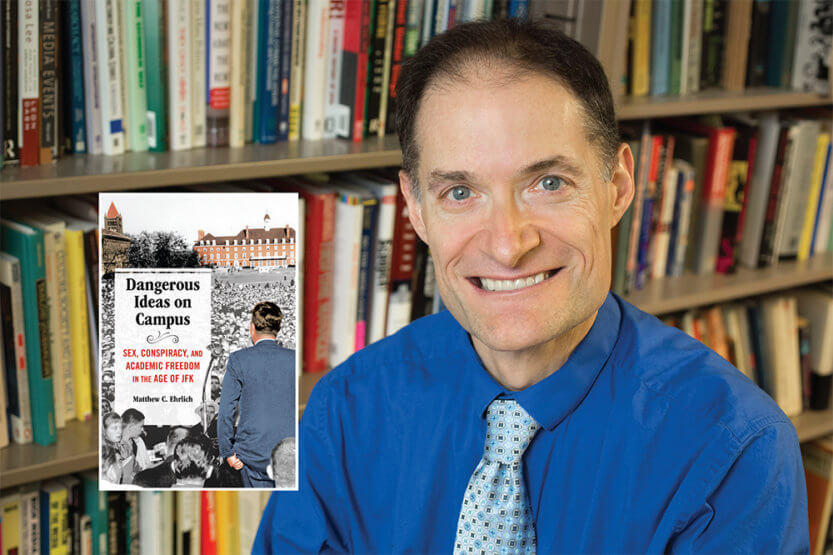Free Speech and Controversy
 “Academic freedom protects people on both the left and the right, and it can include some very unpleasant sorts of things,” says Matthew C. Ehrlich, author of Dangerous Ideas on Campus. (Image by L. Brian Stauffer; Book cover: Harper Collins)
“Academic freedom protects people on both the left and the right, and it can include some very unpleasant sorts of things,” says Matthew C. Ehrlich, author of Dangerous Ideas on Campus. (Image by L. Brian Stauffer; Book cover: Harper Collins) It was the 1960s, a decade that would change everything, and at Illinois, that change would come in a swirl of controversy. In Dangerous Ideas on Campus: Sex, Conspiracy and Academic Freedom in the Age of JFK (University of Illinois Press, 2021), journalist Matthew C. Ehrlich, PHD ’91 MEDIA, tells the story of that tumultuous time in the University’s history.
Your book covers two controversies over free speech and academic freedom that threatened the University’s reputation. The first relates to Leo Koch, an untenured biology professor who wrote a letter to The Daily Illini in 1960 advocating for premarital sex. What was the reaction to Koch’s letter?
At the time, the notion of sex before marriage was deeply offensive to many people, and the University received many angry letters about Koch and his letter. U of I President David Henry believed that Koch had used his credentials as a biology professor to validate his argument, and Koch got fired. That created a media sensation that embarrassed the University. It caused the U of I to revise its academic freedom protections for faculty.
Koch was fired for making statements that may seem innocuous today. But the tenured classics professor Revilo Oliver, ’33 LAS, MA ’33 LAS, PHD ’40 LAS, who promoted conspiracy theories and had a history of hate speech, kept his job even after a years-long public outcry. Why wasn’t Oliver fired?
After the fallout from the Koch situation, the University consistently said, look, this guy has the right to extramural expression. He can speak as a private citizen without fear of retaliation, even if we strongly disagree with him. That’s one of the fundamental tenets of academic freedom. So Oliver kept his job.
How are these controversies and the way the University handled them relevant today?
Academic freedom protects people on both the left and the right, and it can include some very unpleasant sorts of things. Back in the ’60s, the U of I Academic Freedom Committee said, “Academic freedom is not without its price to a university, but the price is worth paying.”

